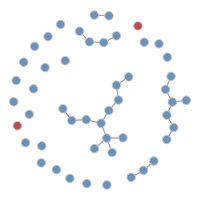Network Modeling for Epidemics
 Network Modeling for
Epidemics (NME) is a 5-day short course at the University of Washington
that provides an introduction to stochastic network models for
infectious disease transmission dynamics. It is a ‘’hands-on’’ course,
using the EpiModel software package
in R.
Network Modeling for
Epidemics (NME) is a 5-day short course at the University of Washington
that provides an introduction to stochastic network models for
infectious disease transmission dynamics. It is a ‘’hands-on’’ course,
using the EpiModel software package
in R.
EpiModel software provides a unified framework for statistically based modeling of dynamic networks from empirical data, and simulation of epidemic dynamics on these networks. It has a flexible open-source platform for learning and building these models. While the software specializes in stochastic network modeling of epidemic dynamics, it also provides tools for deterministic compartmental (DCM) and stochastic individual- (or “agent-”) based models (ICM).
EpiModel resources include:
Simple models that run in a browser window (via
RShiny), with an interactive GUI and downloadable graphical outputs. These tools reduce the barriers to learning the basic concepts of epidemic modeling in each of the three frameworks (DCMs, ICMs and network models), and are perfect for teaching in code-free environments and real-time demonstrations.Built-in generic models that provide basic control over population contact patterns, pathogen properties and demographics through standard coding scripts. These tools are designed to help users get started with EpiModel coding principles and run basic models.
Templates for user-programmed modules that allow EpiModel to be extended to the full range of pathogens, hosts, and disease dynamics needed for advanced research. These tools are designed to support research scientists and professional modelers.
The NME course provides an introduction to all of these resources. It touches on the deterministic and individual-based models, but its primary focus is on the theory, methods and application of network models. The course uses a mix of lectures, tutorials, and labs with students working in small groups. On the final day, students work to develop an advanced EpiModel prototype (either individually or in groups based on shared research interests), with input from the instructors. Students are required to bring their own laptop computer to the course.
Prior to the course, we recommend students review the materials on the PREP page. Each day’s materials will be posted on the respective page linked above.
We are taking a break to update and restructure course materials, so the NME course will not be taught in 2022.
If you would like to get started with EpiModel now, course materials
from 2021 are online for self-learning. An overview of the course can be
found below, and the course materials for each day are available online
via the </> Course Materials link in the navigation
bar at the top of this page.
Additional helpful materials may be found at the EpiModel website.
If you have any questions, please feel free to email us.
2021 Course Information
Lectures provide an overview of the theory, methods and software instruction – they are recorded and posted after the session for asynchronous access.
Labs provide hands-on practice with the software, and will be organized around specific tasks. Traditionally we run these as small breakout group labs, loosely organized by domains of research. The instructions and materials are placed online for access in both real time and later review and use.
The instructions and materials are placed online for access in both real time and later review and use.
Our course will run in two sessions each day:
- Morning session 8-11am US Pacific Daylight Time (PDT)
- 1 hr break for lunch
- Afternoon session 12-3pm US PDT
Course Syllabus
The course uses mornings for lectures, and afternoons for labs with students working in small groups. On the final day, students have the option of developing an EpiModel prototype for their own research projects, with input from the instructors, which includes the EpiModel software developers.
| Day | Topics |
|---|---|
| 1 | Introduction to epidemic modeling; Stochastic models for epidemics; Classical descriptive network analysis |
| 2 | Cross-sectional statistical network analysis (ERGMs); Dynamic statistical network analysis (STERGMs) |
| 3 | Simple epidemic models on networks; Epidemics in fixed populations with network dynamics independent of disease state |
| 4 | General epidemic models on networks; Epidemics in open populations, with interactions between networks, demographics and infection |
| 5 | Extending EpiModel for original research projects; Individual consultations on participant projects |
Returning Students
We encourage previous attendees with active modeling projects to apply to return for a refresher course. The EpiModel package has been significantly enhanced over the last few years. Returning students with active projects will have the opportunity to work with course instructors to address key challenges in the design of their network model code.
Previous Course Offerings
This course, either in its entirety or parts of it, has been offered at the following locations:
- Network Modeling for Epidemics course at the University of Washington in Seattle (2012, 2013, 2014, 2015, 2016, 2017, 2018, 2019, 2020)
- Summer School on Network Statistics in Health Research at the University of Ghent in Belgium (2014, 2015)
- Sunbelt Conference of the International Network of Social Network Analysis (2014, 2015)
- Harvard School of Public Health (2017)
- University of California, San Francisco (2016)
Acknowledgements
Funding
This course is supported by grant number R01 AI138783 from the National Institutes of Health.
Copyright and Attribution
These course materials are distributed under the GPL-3 license, with the following copyright and attribution requirements listed here.
Last updated: 2022-07-07